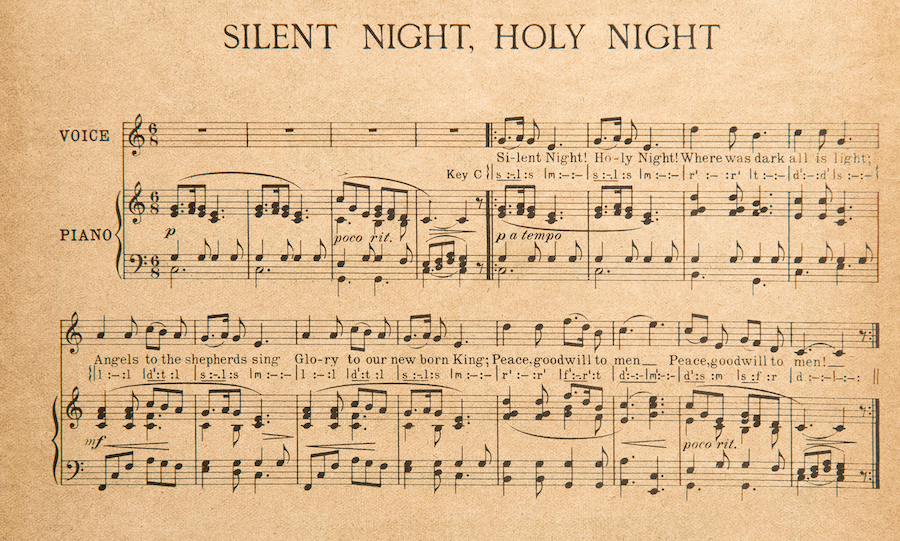“Silent Night” is among the most recognizable Christmas carols, and its origin is a story that’s worth telling. Not only does the song immortalize the most wondrous night of all, but the words pay tribute to the miracle that is as timeless as the One in whose honor it was written.
The origin of the song was discovered only after Felix Mendelson performed it in 1840 at the Court of King William of Prussia to commemorate the birth of Christ. So taken was the king with the song that he wanted to know who wrote it.
After following several clues that led nowhere, its origin came to light through a 9-year-old boy whose father, Franz Gruber, had set the lyrics of the poem to music at the request of Father Joseph Mohr.
According to young Gruber, the lyrics were written on Christmas Eve 1818 by the village priest. On that evening, Father Mohr was working on his Christmas sermon for Midnight Mass when he was interrupted by a knock at the door. A peasant woman asked him to come with her to a home where a baby had just been born.
The priest immediately followed her, and when he arrived, he was deeply touched by the sight of the newborn babe and the peasant couple whose home was the poorest of dwelling places. Upon leaving their home, Father Mohr was filled with joy over the wonder of what he had seen, and as he walked along in the still of the night, his thoughts traveled to another poor couple who had given birth to an infant in Bethlehem while all the world was asleep.
Later that night, after celebrating Midnight Mass, Father Mohr penned the lyrics that would become one of our most sacred hymns. Although the next day was Christmas, Father Mohr wasted no time in asking his friend Franz Gruber to put the words to music, and so it happened that “Silent Night” was born on Christmas Day.
It seems only fitting that the genesis of the song was wrapped in a human event that mirrors the humility of God who descended to Earth as a newborn babe, to a city about which was written:
But you, O Bethlehem of Ephrathah,
who are one of the little clans of Judah,
from you shall come forth for me
one who is to rule in Israel (Mic 5:2).
That a peasant couple and their newborn babe served as inspiration for a song that would be sung in the court of a king is but one example of how God’s ways are not our ways.
One of the things about the story that touches me most is that the priest responded to the knock at the door immediately. Without a moment’s hesitation, he left behind the sermon on which he had been working to answer the call to serve, and because he did, he was richly rewarded.
How easy it is to get caught up in what we’re doing, putting others on hold. To keep others waiting while we attend to our own agenda is averse to humility.
In Luke’s Gospel, we read how Mary went with haste to the hill country of Judah when she learned that her kinswoman Elizabeth was pregnant. She could have remained in prayer, contemplating how the angel’s message changed her life. Instead, she heeded the call of God without hesitation or delay, showing us that no matter how worthwhile our efforts, service should come first.
Immediate obedience is a virtue that has long been esteemed in convents and monasteries, where religious are taught to leave behind whatever they are doing at the sound of the bell. They are to hear the voice of God and obey because moments of delay can cost them dearly.
Prompt obedience may sound simple, but practicing it requires acknowledging that the needs of others are just as important – or perhaps more important – than our own. If you’re looking for a New Year’s resolution, why not try seeing God’s voice in the events of everyday life?
If you tend to procrastinate, this practice will definitely help you to plan and manage your time better. If you are a perfectionist, doing and redoing so that you can shine, you will learn that your best is sufficient, since God makes up what we are lacking.
Father Joseph Mohr understood this, and as a result, Christians everywhere are able to lift their voices in heartfelt wonder and sing, “Silent Night, Holy Night,” during one of the holiest seasons of the year.

